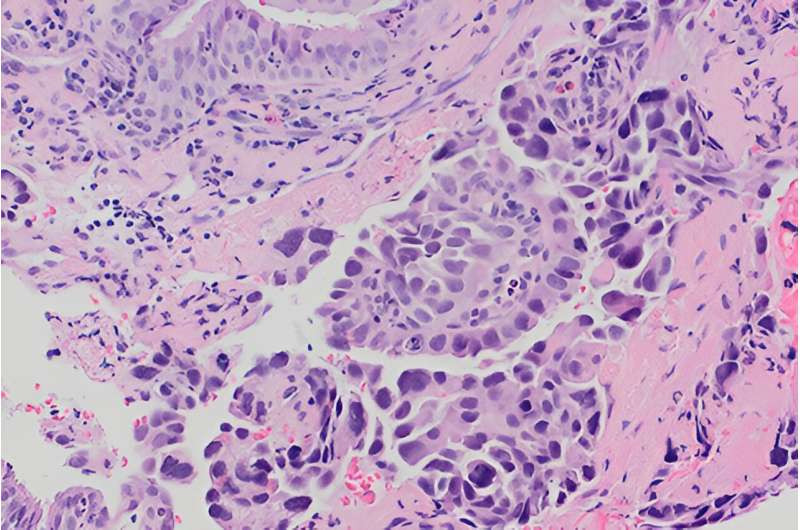This article has been reviewed according to Science X's editorial process and policies. Editors have highlighted the following attributes while ensuring the content's credibility:
fact-checked
trusted source
proofread
Already-licensed drugs could be trialed to potentially treat secondary brain cancer, new research finds

The largest review of papers for brain cancer that has spread from the lungs has found abnormalities in the brain cancer for which licensed drugs could be clinically trialed to find out if they could treat the disease. The research led by the University of Bristol and published in Neuro-Oncology Advances also found genetic differences between smokers and non-smokers. The paper is titled "Genomic landscape and actionable mutations of brain metastases derived from non-small cell lung cancer: a systematic review."
About 25,000 patients in the U.K. suffer from cancer that has spread to the brain -known as metastases—most commonly from lung and breast cancer, and causes death in the majority of these patients.
The genetic mutations in primary lung cancers have been widely studied, but less is known about the changes in the cancer once it has spread to the brain. The research team wanted to find out the genetic changes in brain metastasis from non-small cell lung cancer (NSCLC) and whether there are drugs already available that could potentially be offered to these patients.
The researchers carried out a review from 72 papers of genetic mutations in brain metastasis of NSCLC from 2,346 patients' data on patient demographics, smoking status, genomic data, matched primary NSCLC, and PD-L1, which is a protein found on cancer cells.
The study found the most commonly mutated genes were EGFR, TP53, KRAS, CDKN2A, and STK11. Common missense mutations —mutations that lead to a single amino acid change in the protein coded by the gene— included EGFR L858R and KRAS G12C
In certain cases the genetic mutations were different in the brain metastasis from the primary lung cancer. There were also differences in the genetic mutations in smokers versus patients who had never smoked. Brain metastases of smokers versus non-smokers had different missense mutations in TP53 and EGFR, except for L858R and T790M in EGFR, which were seen in both subgroups.
The research team found from the top 10 commonly mutated genes which had primary NSCLC data, 37% of the specific mutations assessed were different between primary NSCLC and brain metastases. The researchers suggest Medicines and Healthcare products Regulatory Agency-approved drugs already licensed could potentially be tested to treat the disease in clinical trials.
The genetic landscape of the different subtypes of NSCLC is well known. TP53 and LRP1B mutations are common to all NSCLC subtypes, but certain subtypes also have specific alterations. Lung adenocarcinoma is the most common type of lung cancer and has higher frequencies of KRAS, EGFR, KEAP1, STK11, MET, and BRAF somatic mutations—changes that have accumulated in the cancer genome.
Some studies suggested the genomic landscape of NSCLC in smoker's vs non-smokers differ independent of subtype. One study found EGFR mutations, ROS1 and ALK fusions to be more prevalent in non-smokers, whereas KRAS, TP53, BRAF, JAK2, JAK3 and mismatch repair gene mutations were more commonly mutated in smokers.
Kathreena Kurian, Professor of Neuropathology and Honorary Consultant at North Bristol NHS Trust, Head of the Brain Tumour Research Centre at the University of Bristol and co-author of the paper, said, "Our research recommends that all patients should have their brain metastasis examined for mutations in addition to their primary lung cancer because they may be different.
"This evidence could form the backbone for new clinical trials for patients with brain metastasis in non-small cell lung cancer using drugs that are already available."
The team suggest the next steps for the research would be to consider whole genome sequencing on brain metastasis to look for other types of mutations, such as, common insertions/deletions for which drugs are already available.
More information: Lily J Andrews et al, Genomic Landscape and Actionable Mutations of Brain Metastases derived from Non-Small Cell Lung Cancer: a systematic review, Neuro-Oncology Advances (2023). DOI: 10.1093/noajnl/vdad145


















